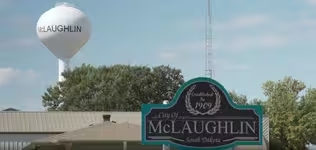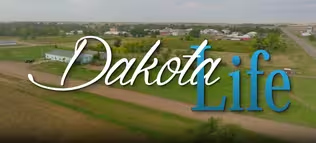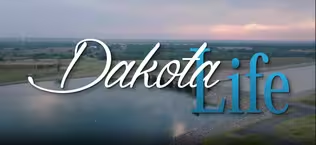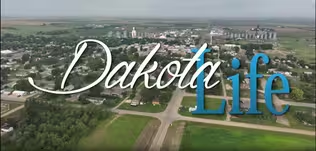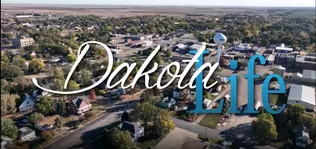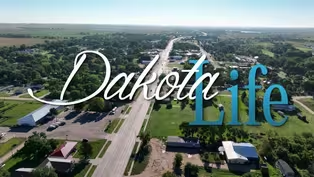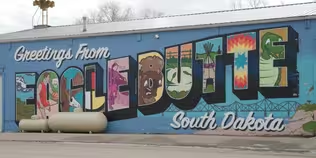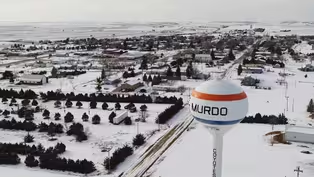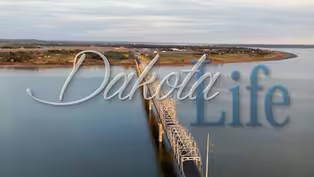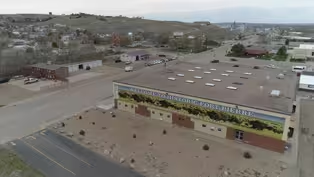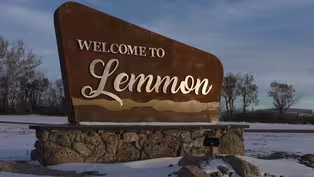Dakota Life
Greetings From Winner
Season 24 Episode 8 | 27m 25sVideo has Closed Captions
Winner has great baseball, theatre, and local authors and is a sportsperson's paradise.
In this episode, we share stories of Winner's baseball tradition and the Leahy bowl, take you behind the scenes at the local playhouse and the community-run movie theatre, learn how a local poet takes uses her real-life ranching experience to inspire her poetry, and explore the pheasant hunting traditions of the community.
Problems playing video? | Closed Captioning Feedback
Problems playing video? | Closed Captioning Feedback
Dakota Life is a local public television program presented by SDPB
Support Dakota Life with a gift to the Friends of Public Broadcasting
Dakota Life
Greetings From Winner
Season 24 Episode 8 | 27m 25sVideo has Closed Captions
In this episode, we share stories of Winner's baseball tradition and the Leahy bowl, take you behind the scenes at the local playhouse and the community-run movie theatre, learn how a local poet takes uses her real-life ranching experience to inspire her poetry, and explore the pheasant hunting traditions of the community.
Problems playing video? | Closed Captioning Feedback
How to Watch Dakota Life
Dakota Life is available to stream on pbs.org and the free PBS App, available on iPhone, Apple TV, Android TV, Android smartphones, Amazon Fire TV, Amazon Fire Tablet, Roku, Samsung Smart TV, and Vizio.
Providing Support for PBS.org
Learn Moreabout PBS online sponsorshipMore from This Collection
Dakota Life stories from towns in central South Dakota
Video has Closed Captions
In the heart of the Standing Rock Indian Reservation, we discover McLaughlin. (29m 29s)
Video has Closed Captions
We travel to Burke and introduce you to a writer, an artist, and the twins of Franklin Street. (29m 50s)
Video has Closed Captions
Timber Lake celebrates its heritage in July with the Days of 1910 activities. (29m 41s)
Video has Closed Captions
Uplifting culture of the Dakota Oyate on the Crow Creek Reservation. (29m 17s)
Video has Closed Captions
Onida is home to a ranching family, a salmon fisherman, and a memorabilia collection. (27m 18s)
Video has Closed Captions
Dakota Life travels to the community of Mission. (29m 34s)
Video has Closed Captions
Dakota Life visits the community of Eagle Butte (26m 58s)
Video has Closed Captions
Fort Pierre is our host community this month for Dakota Life. (28m 36s)
Providing Support for PBS.org
Learn Moreabout PBS online sponsorship(upbeat music) - [narrator] This is a production of South Dakota Public Broadcasting.
(upbeat music) - [Instructor] Winner got its name from early mayor and Townside booster EG Barnham.
He and partisans of several nearby towns, competed for the coveted designation as county seat.
The towns of Tripp County take route to the Rolling Prairie just west of the Missouri river.
Many of the communities were formed soon after parts of the Rosebud reservation were open to settlement in 1909.
People were lined up and waiting to move in.
Nearly 115,000 homesteaders applied for the 6,000 sites that were available.
Names were drawn on October 19th, 1908 in Dallas, South Dakota.
The country where homesteaders would try their hand, was Prairie grassland.
Studied here and there with high Bluffs like, Dog Ear Buttes, Turtle, and Rattlesnake Butte.
The young adult author, Marian McNeely, referred to the Winner area as, "Where the West Begins".
That was in her pioneer novel, "The Jumping Off Place".
Well, she may have been right.
Early on, homesteaders struggled with the drought.
The 1910 harvest was very poor but, the Chicago and Northwest Railway believed in Tripp County, as the railroad laid track, town sites continued to grow.
One town in particular, would benefit from a combination of geographical position and the savvy efforts of its founders.
Welcome to Dakota Life and greetings from Winner.
(upbeat music) - [Narrator] This program has made possible, with your support and with corporate support from John Polka and the Ameriprise financial advisors providing South Dakotans with financial confidence in expected and unexpected times with offices in Winner and Spearfish and by Golden West telecommunications cooperative.
We're everywhere people connect, like Winner.
- Archeologists have discovered evidence that Native American mound builder cultures lived in this area long before the Mayflower set sail from England or Lewis and Clark, sailed up the Missouri.
Lieutenant GK Warren, surveyed this area in 1855.
He was journeying from Fort Laramie to Fort Pierce.
He described the area as having natural springs, lush wild cherries and plums.
And he said, "The grass grows luxuriantly" and buffalo tracks were frequent.
Ponka and Lakota hunters, knew that very well.
After 1889, the General Allotment Act, split the great Sioux reservation and much of the present day Tripp County was within the Rosebud Indian reservation.
That of course named for the Rosebud Creek agency.
And that agency founded by Sikangu Lakota chief, Spotted Tail.
Well, the congressional action, that opened more Rosebud reservation land a settlement, set off kind of a bitter fight over the location of the county seat.
When Tripp county was organized in 1909, voters awarded Lamro, to be temporary county headquarters, but the Western Townside company which owned Winner, had its eyes on that prize.
It didn't hurt when the Chicago and Northwestern Railway planners, drew its Norfolk line extension right through Winner and missing Lamro by a little over two miles.
So, Winner prevailed over Colome, Witten and Lamro but the residents of the latter seemed to take it the hardest.
Most of the buildings in Lamro, were actually moved to Winner which was more than happy to take them all.
For some years, there was a north side, south side divide along third street, original Winner rights on the north side.
Lamro expats on the south.
Even Lamro's newspaper, "The Lamro Advocate", they made the move too changing the name to "The Winner Advocate" which is still in circulation today.
Mayor EG Barnham, rallied town around a water system that piped water in from natural springs about seven miles away.
Over time, lingering enmity over the county seat battle has softened.
Oh, an ember or two may still smolder somewhere on the south side, but Winner rights, ever magnanimous in their victory, tend to win you over.
Coming up, we'll visit a long running community playhouse.
We'll learn how the Winner pheasants and other local baseball teams have slugged it out at the Leahy Bowl.
And we'll meet some folks who crack another kind of pheasant.
But first, renowned cowgirl poet, Yvonne Hollenbeck.
She performs locally and around the country.
We sat down with a to talk poetry, quilting, and life on the Prairie.
- [Yvonne] Have you ever seen the Prairie when it's covered up with snow or watch an evening sunset leave its purple after glow?
Have you ever seen a newborn calf wobbling to its feet and before it's even a minute old, it knows just where to eat?
You can't get in your saddle and red cross Prairie sand or see an eagle on the wing and not believe in God.
A cowboy doesn't worship in a building made of stone.
He worships with his maker out of nature all alone.
His church is in the great outdoors.
The valley heavens gate.
His favorite hymens are cayote that's calling to it's mate and he doesn't do his tithing dropping money in the hand, it's by being a good caretaker to the creatures and the land.
And he makes his own communion as a choir of songbird sings as he cups his hand and drinks a fresh cold water from a spring.
Okay.
I'm Yvonne Hollenbeck.
I'm known as a cowboy poet but I'm not a cowboy.
I married one.
Well, actually both my grandmothers always wrote poem.
All our grandmothers did.
They either wrote it or they collected it from the Capper's weekly papers and stuff.
And many times my bedtime stories was a poem.
I was what you'd call a closet poet.
And I took actually a photography class, a night class, and the lady that taught it was a freelance writer.
And somehow we got on the subject of poetry and I told her I like to write it.
She said, could I see some?
So I showed her a couple of poems and she wonder if she could have a copy.
And the next thing I knew, some lady in the grocery store said, "Yvonne, I really liked that poem of yours."
I said, what poem?
The one in the Stock Growers Magazine.
And this freelance writer had printed one of my poems so that's when I come out of the closet.
(Yvonne laughs) But, I did write this poem about how, what a bailout is on the ranch.
So when you feed the cattle hay.
So this lady came up to me I wanna talk to me and she wouldn't know if she'd get copy of it.
Then she wanted to interview me and she was from the Los Angeles Times.
And that poem ended up on the front page of the Los Angeles Times.
And from there, it went to practically every major newspaper even in foreign countries.
I know it was in Omaha World Herald in Chicago Tribune and just these major papers just this poem.
They really got a kick outta it I guess.
My poor husband, he said he's afraid to ask me to help him.
He's afraid something will happen and I'll write a poem about it.
(Yvonne laughs) Yeah, I do.
I have one about sorting cattle and how the hand signals.
And he's standing in with a bunch of cattle and I'm running the gate and he is going like this.
And I of course you can't hear anything 'cause of the cattle bell and everything.
So, I'm thinking he's wanting me to let him out.
No.
He wanted me to shut the gate and turn him back.
Well, things like that happen and it is good fuel for a poem.
I tell you what my husband's favorite poem is.
And it was this time of year and we were (indistinct) and it was a Sunday and he came in the house and he said... All right.
I told him I said, you know, it's been a long time since we've been to church.
And he said, "Yvonne, every time I go out that door, I go to church."
So from the dawning of the springtime to Autumns golden rod, there's no better place to worship than to be out there with God.
And the next time you hear a Meadowlark singing from its perch, it's inviting you to worship with him there at nature's church.
- Couple of years ago, members of the local rotary club got together to spruce up downtown Winners Centennial Plaza.
Local artist, Ruth Novotny, who runs the hobby shop, created a series of colorful murals that capture scenes from a South Central Dakota Life.
In front of the Tripp County courthouse, the World War I Memorial, is a bronze cast of John Pauling's over the top.
It's one of several models of Doughboy sculptures that memorialized veterans after the war.
On the outskirts of town, a Winner cinema tradition is going strong.
Harvey Fast, built the Winner Drive In, in 1950.
Through the years, Harvey and Betty Fast upsized and they resurfaced the screen repaired tornado damage added a playground and planted over a thousand trees on the 20 acre grounds.
When drive-ins started to disappear, Harvey dug in.
He told South Dakota magazine in 1996, "When it got bad and the others gave up, that's when I got more determined."
Harvey Fast passed away in 2004, but the Winner Drive-In is still in the family.
And it's still going.
Not many towns the size of Winner maintain a drive-in, an indoor movie theater and an active community playhouse.
Winner is a Prairie hub for the performing arts.
So, let's have a curtain call for the people who light up the stage and the screen at the Winner Community Playhouse and at the a Winner Pix Theater.
- Rick Meister ran the Pix Theater for many, many years.
He owned and ran the Pix Theater and it was kind of his second life.
I mean he had a full-time job but he was open seven nights a week he was here.
Rick made his wishes known to his family that he wanted to see the theater continue in the community of Winner.
So, after he had passed away, the family contacted the chamber of commerce about gifting the theater to the city of Winner.
- The chamber office had the opportunity to take it on and then, from there they went on to have a board take it over.
- [Narrator] There was a lot of repairs that needed to be made at the time.
So we held a Radiothon because obviously we had the theater but we had no fans.
So we held a Radiothon thinking that hopefully we'd raise $10,000 was what our goal was.
We raised $40,000 in one afternoon.
- It's really neat to see people get so excited about us getting the week of movies that they want to see.
A lot of people tell us, it's awesome that our local theater can get shows right away so that we don't have to travel to go see a movie.
We can just say right here in our hometown.
- [Narrator] In addition to a hometown screen, Winner supports a hometown stage.
The Winner Community Playhouse.
(group chattering) (audience laughing) - We had a group of interested people who wanted to have live theater in Winner, South Dakota.
They started in 1972 and were sponsored by South Dakota Arts Council.
Did a couple plays in a couple of years and decided that they would form Winner Community Playhouse.
So we went from 1972 until about 1992 without an actual home or a place to perform in.
We begged, borrowed, stole practically, places from the school, the local Legion club, wherever they would let us have a play.
And we finally have a home of our own.
After all of that time, we have a place to perform in that is available to us 24/7 which we love.
- Playoffs has been...
It's a fun, fun community project.
And you get so many people.
And then when we get the kids involved with the high school, we do a summer program for some of the kids which helps get them into middle school so we can do, you know, there's middle school plays for the one act that we do in January.
And that's also contest time.
And that gets us to where we can go to a bigger theaters too.
Like in, you know, some of the Sioux falls.
And in here we, we do okay here.
- [Narrator] We're totally funded by our community.
We send out a membership letter every year and people respond at their will whatever they feel they can afford that here.
So we value our community involvement.
We couldn't be here without our community help.
(group chattering) - It's a very great asset to our community.
(indistinct) elementary, pre school, high school.
- I like them all.
I like them all They're all really great.
They have local talent and the kids, high school, grade school kids, feel fantastic job.
- Oh, good, she's gone.
We gotta find another face.
Look for anybody (indistinct) (audience laughs) (audience claps) - There is a stage or a screen, ready for budding young actors of any age to share their creative arts here in Winner.
But what about the athletes?
Don't worry.
They're doing just fine.
In 2021, Winner High School's football team, finished a perfect season with its second state championship in a row.
That was the ninth title for the Winner warriors so far.
The girls basketball stand out.
Bella Sweatland joined the 2000 point club this year and the warriors wrestling team, brought home the class B team dual state championship trophy.
The athletic tradition of excellence has been around for a long time here at Winner.
Some, trace it back to Frank Leahy.
The Gridiron was where Leahy became a legend.
He played high school football in Winner, then he played tackle for Newt Rock News last three teams at Notre Dame.
And he returned to coach the fighting Irish later in his career.
Now, his name has become synonymous with another sport.
See it was 1948, the Winner Athletics Associate built the Leahy Bowl.
Through the years, the stadium has been home to the Winner pheasants of the former Basin League, American Legion baseball, school and little league teams too.
Winner baseball history, has a very interesting starting lineup from the leagues, the teams, and the players that have taken the field here at the Leahy Bowl.
- At that time when the war was over, everybody came home and a lot of stuff going on.
So a bunch of businesses decided that we ought to be playing these games at a better ballpark.
So in 1949, that's when Leahy Bowl was completely built and it took a couple years.
I understand they dug it a cavern out of the side of a hill.
And it's pretty cool that way, because when we have a game up here, you'll see 60 cars parked up here and people sit in their cars and they'll honk their horns when somebody gets a hit.
- [Narrator] When you visit the Leahy Bowl, the bowl portion of the name, is evident as you look down onto the field from the hillside.
But why is it that it's named after Frank Leahy?
- He was second winning as coach at percentage wise, at Notre Dame history.
He had five consecutive seasons without a loss.
I mean, he was a great athlete, came from Winner.
He was actually born in O'Neill, Nebraska, went to high school here, graduated high school in Omaha, Nebraska.
But every story he ever told about himself, he always referenced his time in Winner, South Dakota.
- [Narrator] The Basin League was part of Winner's baseball story.
The league got its name from the teams all located in the Missouri river basin.
And it existed from 1948 to 1973.
League brought large crowds, more great baseball and some big names to the Leahy Bowl.
- But at that time, lot of college kids came here.
Jim Palmer was one, Merv Rettenmund, he played here, but we would play games against teams that were also in the Basin League like Bassett Nebraska, had a heck of a good team.
My grandfather would tell me that 5,000 people would come to Leahy Bowl to watch Bassett play winner.
- [Narrator] Baseball still brings lots of fans to the Leahy Bowl and America's pastime is still as strong as ever in Winner.
- I think for this community, there's s till a lot of farmers and ranchers, but you know, and their kids can all play baseball.
And so, that's... You know, when I was a kid, that was the only thing you could do, was play baseball.
There wasn't other sports or nothing, you know.
So, I think there's still that culture here.
- Even if you weren't the greatest player, you did it just so you get out of the hayfield and you'd go to town and get to play with your buddies.
You know, a lot of those guys are, you know, had families, they're those guys are about my age and everything.
I mean, it's kind of really rooted and especially like in all these small towns, you know, baseball's big.
Everybody had an amateur team.
Everybody had a Legion team.
You know, you kind of did what you could to get together and play and how you grew up in the summertime you played baseball.
- [Narrator] Most young ball players, dream of playing in the major leagues.
Some fulfill those dreams in college are beyond in their baseball career.
But the feeling players get on a warm summer night at Leahy, is truly tough to outdo.
No matter the success of their baseball career, playing at the Leahy Bowl is a cherished memory.
- The field it's a little bit better than some of the field.
I grew up playing Colome's field which I didn't know anything better.
You know, scanning the field, practice football in the outfield, you know, typical small town baseball field, but getting to come up here was kinda like the cathedral of, you know, getting to play baseball.
You know, you got that grass infield, you got pretty excited that, hey, I get to go play at Leahy.
When you're, you know, 13 years old and you come off of playing 70 foot bases, you know, to come up to Leahy Bowl, you're kinda like oh boy, this is the big field.
This is, you know, now we're really playing.
You kind of really felt like you were moving up to the big leagues when you got to come play at Leahy Bowl for the first time.
- [Narrator] As small communities struggled to field teams in all divisions of baseball, Winner is welcoming all players to be part of the Winner baseball tradition.
- One reason I think baseball's so strong in Winner is because we're not just Winner we're community.
I mean, Clearfield got incredibly proud baseball traditions, so does Colome But it's gotten the point with population, we embrace each other and we all play together.
So, when we're not pushing them away, they're not pushing us away.
We're coming together.
So we still can compete and we still play the game.
- There's more to discover about Winner's baseball story.
You can satisfy that curiosity and check it out at sdpb.org/dakotalife.
Winner's giant pheasant may not be as big as Huron's, but anyone can tell you this area, is a contender for the title of pheasant capital of the world.
Of course, pheasant hunting is a social and a family tradition.
But what is it about this area that has some calling it a hunting paradise for sportsmen?
Well, it's a combination of habitat and expertise to host, guide and help you complete your hunt.
It's the open Prairie.
The wooded areas, rivers, stock dams, and lakes that provide the habitat.
And then, there are the friendly people, who have the know-how to help you make the most of it.
- [Narrator] There's a lot of really good habitat around here.
That's because the local community puts so much work into that habitat.
I mean, they're out there all year making sure that come pheasant season, deer season, turkey season, that they're out there enjoying it.
- [Narrator] Dillon Bates is the game fishing park's conservation officer for the Winner area, serving Tripp, Todd, Mellette and Gregory counties.
So that includes lake Francis case on the Missouri.
- It's a really good fishery.
It's I mean, this time of year Chamberlain all the way down to pigs town, fishing's really good.
You know, we get people from all over coming in then rec boaters during the summer.
It's a beautiful location, beautiful lake, beautiful state parks.
So, having that in this area is, you know, something that's pretty special too.
- [Narrator] But there's nothing like the third weekend in October.
- Everybody's just excited for (indistinct) season.
You know, it brings in a lot of people, brings in a lot of money, you know, every year it creates those memories that you know, people can look back on and remember their trip to Winner and the locals it's just...
I mean, Winner is pheasant country.
- [Narrator] It attracted Ryan Pile to Winner from Northern California.
A chef by trade, he also guides at Wiley Cock Lodge, One of several lodges in the area that provides an upscale hunt.
- There is a lot more to the pheasant hunting experience and being here at a big lodge in South Dakota.
The lodge itself, I mean, we have everything you need here from the bar, chow hall, you know, full locker room, pro shop, plenty of space full of kennels.
So, you know, bring the dog as well.
But yeah, it's about camaraderie.
A lot of our guys, you know, we got a couple going on 11, 12 years that I have been here since the first year of the lodges.
And they're here opening weekend every year, same group of guys.
- [Narrator] The goal at the lodge is to make sure all groups look forward to being back every year.
- I would say our attention to detail and just the way we focus on everything here from the time they show up and the way we plant and groom the fields and the way we manage that for the pheasants and give them, we manage our fields more or less for the pheasants.
They're a little hard walking at times, but it makes for better populations.
And then as far as the lodge and everything here, you know, when you're here this is your home.
And if you can see it, drink it, eat it.
You know, go ahead.
- I don't get to hunt because I'm busy the hunting times of year but I make up for it.
I fish a lot.
A lot of fishing.
- [Narrator] The reason Rich Kuchera, always known as Kooch is too busy to hunt, is he's running a business, cleaning and processing thousands of pheasants.
- A friend of mine suggested it when the bank was gonna close down his bin and he wanted to send me some of the clientele.
He says, if you wanna clean them in your garage.
And I wanted nothing.
My wife and I wanted nothing to do with it close to our house.
So I rented a spot here and we were gonna do it for five years to help our kids through college.
Extra money always comes in handy.
And man, that was 28 years ago now.
So, (laughs) we went a little over the five year period.
- [Narrator] Not only are his clients from all around the country, but his byproducts also sell nationwide.
Hats, cookbooks and leftover feathers and pellets become fishing flies and hatbands.
What Kooch collects, are the relationships, regardless of who you are in real life.
- They don't get treated like celebrities in my shop.
I took and Tom Knapp was in one day and some people that worked for me wanted to get their signature.
His signature.
And I told him, he's just here is a hunter.
He's not a celebrity.
I said, the only celebrity in this shop at this moment, is me.
I said, he's just a pheasant hunter at this time.
Tom got a big charge out of that (laughs).
- [Narrator] I've really enjoyed small town.
You know, originally being from Northern California, it was a large change.
I enjoyed the decreased number of people, but also spending more time with my clientele.
- [Narrator] A lot of people I talk to, say I've been coming here every year for 30 years, and there's a reason for that.
They've built a relationship with the people whose land they hunt on.
The pheasant numbers are great.
And just the atmosphere of being in Winner for pheasant openers pretty cool.
- EG.
Barnham, had a hunch about one Winner.
Maybe he had some insight information.
Maybe he had some friends at the Chicago Northwestern railroad.
Either way, he had confidence in the town he picked as the winner in the battle for the Tripp County seat.
This is a part of South Dakota, where a population of 3000 ranks near metropolis status and Winner makes the more of what it has.
You see, you'll be traveling in many miles in just about any direction to find a larger town.
And from tradition to new technology, the people here in Tripp County, don't need to make that trip near as often.
They've made a home.
They give to their community, on the court and on the field, on the stage, at the concession stand, at the art park or by inviting hunters from across the state and around the nation to come and share habitat at a hunting lodge.
Talent doesn't go to waste here and winter.
It's a place where everybody, even the people from Lamro, can put their unique gifts to use and help others do the same.
You see as it turns out, Barnum's hunch was a pretty safe bet.
You can revisit our stories about Winner and all the other communities at sdpb.org/dakotalife.
Thanks for coming along with us to Winner.
I'm Larry Rohrer.
For all of us here at SDPB, thanks for watching.
(upbeat music)
Support for PBS provided by:
Dakota Life is a local public television program presented by SDPB
Support Dakota Life with a gift to the Friends of Public Broadcasting
